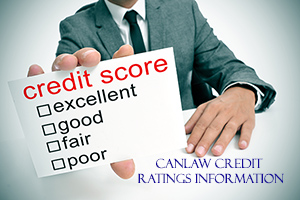 CanLaw
CanLaw
Credit Problems? How to legally reduce or eliminate all your debts.
How Do Credit Scores Work?
Current as of
What Do Your Credit Rating and Credit Score
Mean in Plain English?
Why do I have a credit SCORE and a credit RATING?
CREDIT SCORE
WHAT IS YOUR CREDIT SCORE?
Your credit score ranges from0 to 900 and is an overall score for your total credit history.
- Excellent Credit: 750+
- Good Credit:700-749
- Fair Credit:650-699
- Poor Credit:600-649
- Bad Credit: below 600
WHAT DO YOUR BASIC CREDIT REPORT RATINGS MEAN?
These ratings are used in conjunction with your Credit Score to determine your credit worthiness
Standard Credit Bureau Ratings in Canada
- R0 Too new to rate; approved but not used
- R1 Pays within 30 days of billing, or pays as agreed
- R2 Pays in more than 30 days but less than 60 or one payment past due
- R3 Pays in more than 60 days but less than 90 or two payments past due
- R4 Pays in more than 90 days but less than 120 or three or more payments past due
- R5 Account is at least 120 days past due but is not yet rated R9
- R6 No rating exists
- R7 Paid through a consolidation order, consumer proposal or credit counselling debt management program
- R8 Repossession
- R9 Bad debt or placed for collection or bankruptcy
 Lenders (and employers or landlords) will first look at your Credit Score to determine if it is worth processing your application.
Lenders (and employers or landlords) will first look at your Credit Score to determine if it is worth processing your application.
- 720 - 850 - Excellent - The best financing terms and represents the best score range
- 700 - 719 - Very Good - qualifies to receive favourable financing
- 675 - 699 - Average - will qualify for most loans
- 620 - 674 - Sub-prime - May qualify but will pay higher interest
- 560 - 619 - Risky - Will have trouble getting a loan
- 500 - 559 - Very Risky - You need to work on improving your rating
Your Credit Score Is Based On These Factors
- 35% of the score is determined by payment histories on your credit accounts, with recent history weighted a bit more heavily than the distant past;
- 30% is based upon the amount of debt you have outstanding with all creditors;
- 15% is produced on the basis of how long you've been a credit user (a longer history is better if you've always made timely payments);
- 10% is comprised of very recent history, based on your efforts to obtain loans or credit lines in the past few months;
- 10% is calculated from the mix of credit you hold, including instalment loans (like car loans), leases, mortgages, credit cards, etc.
WHERE TO GET YOUR CREDIT REPORTS
Consumer Relations Department
Box 190 Jean Talon Station
Montreal, Quebec H1S 2Z2
Tel: ( 514 ) 493-2314
1 800 465-7166
Fax: ( 514 ) 355-8502
WHERE TO GET YOUR CREDIT REPORTS
Consumer Relations
709 Main Street W
Suite 3201
Hamilton, On L8S 1A2
Tel: 1 800 663 9980
Fax: ( 905 ) 527-0401
CHECK YOUR CREDIT REPORT REGULARLY
By law, you are entitled to a copy of all the information a credit agency has on you.
Start by obtaining your credit reports from both Trans Union and Equifax. Each bureau uses different methods to calculate your report, so they will be different and you need to monitor both.
Do not phone, they will not discuss your credit report on the phone.
Errors are very common. You can dispute erroneous items on your report. Correcting them will take a lot of time, work and effort.
Call the credit bureau and point out their errors. They will send you a reporting form The credit bureau must review your complaints, however they will insist on your supplying the material using their forms. The forms explain how to file disputes and get corrections made.
It is an uphill battle and you will have to fight them and be persistent.
You also have a right to place a 100 word statement on the credit bureau file to be given to anyone who obtains a future report. To obtain a hard copy of your personal credit file by mail:
CREDIT RATING
WHAT IS YOUR CREDIT RATING?
Your credit RATING ranges from 1 to 9 and there is a rating for each item in your credit history
Your Credit Score is used to determine what sorts and amounts of credit you qualify for It is the primary lending tool used by most lenders.
It is a numerical score between 300 and 900 calculated by assigning values to all the items in your basic credit report, credit history and financial life. The higher the score the better your credit.
It is used to screen all credit applicants and eliminate those who fall below a certain score.
There are two types of credit reports.
Your Credit Rating and Your Credit Score
You need to monitor both your credit rating and your credit score. Lenders Employers Landlords check your Credit Score before getting your full credit rating report.
What if there is an error
on my credit report?
If you see an error on your report, report it to the credit bureau.
Consumers wishing to dispute items on their credit files can do so by contacting the Credit Bureau directly
Beware of Credit Repair Scams.
 You are the only one who can "fix" your bad credit. There is no shortcut to erasing bad credit records. Building good credit takes time and effort. You cannot pay some scam outfit to magically get you good credit
You are the only one who can "fix" your bad credit. There is no shortcut to erasing bad credit records. Building good credit takes time and effort. You cannot pay some scam outfit to magically get you good credit
Credit repair scams prey on the greed and ignorance of people with credit problems looking for a quick fix. Anyone who offers to repair your bad credit rating quickly for a fee is lying to you and will take your money and do nothing.
Only you can fix your credit.
WHAT DO THE TERMS MEAN?
Past Payment History: Past due items on file, severity of any delinquency, presence of any adverse public records, such as bankruptcy, judgments, lawsuits, liens, etc. This category alone suggests that you should make bankruptcy your last resort option only.
Amount of Credit Owing on Accounts How many accounts you have with balances, proportion of credit lines used to credit available proportion of instalment loan amounts still owing.
Length of Time Since Credit Established Time since you opened your account(s) and how active those account(s) have been.
Acquisition of New Credit How often you have recently searched for or obtained new credit and your relative success at establishing positive credit history following past payment problems.
Types of Credit Established Number of and types of credit accounts established.
Credit Problems Law?
Put Your
BUSINESS CARD/
BANNER AD HERE
$250 year
Includes a free back
link to your web site
Click for Details
